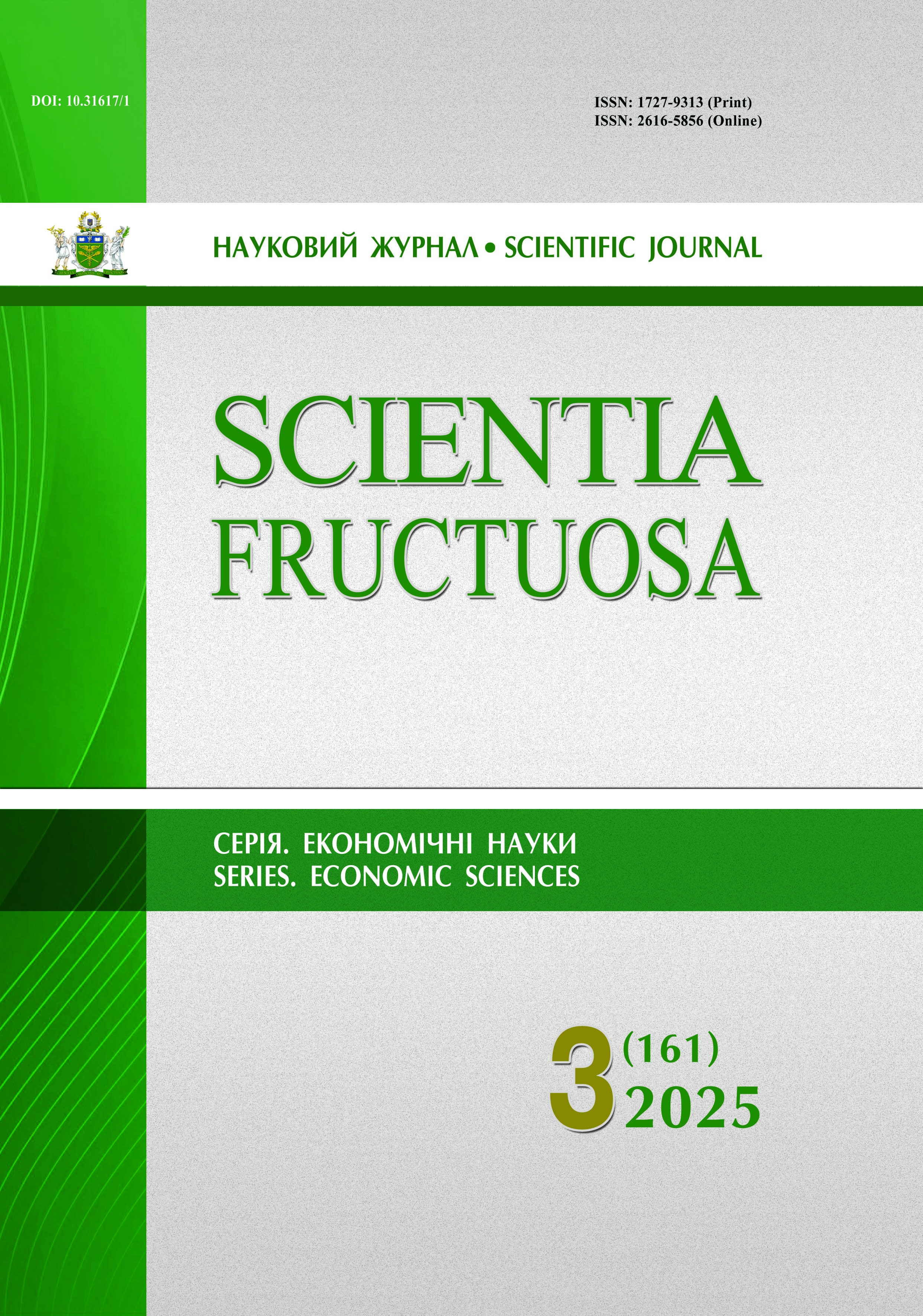Державний податковий менеджмент в умовах воєнного стану
DOI:
https://doi.org/10.31617/1.2025(161)11Ключові слова:
податки, податковий менеджмент, податкова політика, податкове регулювання, бюджет, доходиАнотація
В умовах воєнного стану нагальним постало завдання підвищення якісного рівня державного податкового менеджменту. Метою дослідження є розкриття принципів державного податкового менеджменту та обґрунтування напрямів його удосконалення. Висунуто гіпотезу, що обґрунтованість державного податкового менеджменту визначає здатність країни не лише мінімізувати фіскальні ризики, але й бюджетної безпеки держави в цілому. У дослідженні використано спеціальні та загальнонаукові методи: проблемно-пошуковий, комплексного аналізу та узагальнення, наукового абстрагування, економіко-статистичний. Здійснено оцінку державного податкового менеджменту України в умовах воєнного стану та аргументовані напрями його удосконалення. До основних напрямів розвитку державного податкового менеджменту Україи належать: посилення гнучкості та адаптивності податкового інструментарію до соціально-економічних процесів; синергія податкового інструментарію в контексті забезпечення бюджетної стійкості та зниження фіскальних ризиків; посилення координації податкової політики з іншими складовими фінансової політики; розвиток податкового інструментарію
Посилання
Amiti, M., Redding, S. J., & Weinstein, D. E. (2019). The impact of the 2018 tariffs on prices and welfare. Journal of Economic Perspectives, 33(4), 187-210. https://doi.org/10.1257/jep.33.4.187
Boiciuc, I. (2015). The effects of fiscal policy shocks in Romania: A SVAR approach. Procedia Economics and Finance, (32), 1131-1139. https://doi.org/10.1016/S2212-5671(15)01578-6
Burnside, C., Eichenbaum, M., & Fisher, J. (2004). Fiscal shocks and their consequences. Journal of Economic Theory, 115(1), 89-117. https://doi.org/10.1016/S0022-0531(03)00252-7
Buryak, S. V. (2009). Tax management as a component of public management. Scientific Bulletin of the National University of the State Tax Service of Ukraine, (3), 92-96.
Carnazza, G., Liberati, P., & Sacchi, A. (2023). Does politics matter? A comparative assessment of discretionary fiscal policies in the euro area. European Journal of Political Economy, 102435. https://doi.org/10.1016/j.ejpoleco.2023.102435
Constitution of Ukraine. (1996). https://zakon.rada.gov.ua/laws/show/254%D0%BA/96-%D0%B2%D1%80#Text
Ferraro, D., Ghazi, S., & Peretto, P. (2020). Implications of tax policy for innovation and aggregate productivity growth. European Economic Review, (130), 103590. https://doi.org/10.1016/j.euroecorev.2020.103590
Holoborodko, T., & Porosla, P. (2022). State tax management: topical issues of PIT taxation. Collection of Scientific Papers "Scientia", 1(19), 19-23. https://previous.scientia.report/index.php/archive/article/view/524
Iacopetta, M., & Peretto, P. (2024). Business taxes, management delegation, and growth. European Economic Review, (170), 104850. https://doi.org/10.1016/j.euroecorev.2024.104850
Jones, J. (2002). Has fiscal policy helped stabilize the postwar U.S. economy? Journal of Monetary Economics, 49(4), 709-746. https://doi.org/10.1016/S0304-3932(02)00113-7
Kmit, V. M., & Ivakh, H. V. (2011). The role of tax regulation in the system of state tax management of Ukraine. Current problems of regional economic development, 7(2), 310-316.
Koval, N. I., & Podolianchuk, O. A. (2023). Tax management in modern realities: Theoretical and legal foundations. Efficient Economy, (3). http://nbuv.gov.ua/UJRN/efek_2023_3_2
Krysovatyi, A. I., & Tomniuk, T. L. (2012). Tax administration in Ukraine: organization and directions of transformation: monograph. Ternopil: Economic Thought of TNEU, 212 p.
Lahodiienko, N. V., Yevtushevska, O. O., & Nakisko, O. V. (2022). The place of tax management in the state finance management system. Efficient Economy, (4). http://www.economy.nayka.com.ua/?op=1&z=10172 https://doi.org/10.32702/2307-2105-2022.4.6
Law of Ukraine No. 4015-IX. (2024, October 10). "On amendments to the Tax Code of Ukraine and other laws of Ukraine regarding ensuring the balance of budget revenues during martial law". https://zakon.rada.gov.ua/laws/show/4015-IX#Text
Law of Ukraine No. 4059-IX. (2024, November 19). "On the State Budget of Ukraine for 2025". https://zakon.rada.gov.ua/laws/show/4059-20
Ministry of Finance of Ukraine. (n. d.). Official website of the Ministry of Finance of Ukraine. https://www.mof.gov.ua/uk/
Pais, C., & Dias, C. (2022). The implications of book-tax conformity and tax change for the earnings management of Portuguese micro firms. Journal of International Accounting, Auditing and Taxation, (46), 100448. https://doi.org/10.1016/j.intaccaudtax.2022.100448
Pragidis, I., Gogas, P., Plakandaras, V., & Papadimitriou, T. (2015). Fiscal shocks and asymmetric effects: A comparative analysis. The Journal of Economic Asymmetries, 12(1), 22-33. https://doi.org/10.1016/j.jeca.2014.10.003
Samoil, T. V., & Khomulyak, T. I. (2022). The relevance of changes in the tax system of Ukraine. Collection of Scientific Papers of Ternopil National Technical University, 3(25), 44-53. https://elartu.tntu.edu.ua/handle/lib/39940
Shvabii, K. (2023). Taxes during and after the war. LB.ua. https://lb.ua/blog/kostiantyn_shvabii/517086_podatki_pid_chas_viyni_pislya.html
Sidelnikova, L. (2020). Theoretical and organiza-tional dominants of tax administration in the system of state tax management. Economy and Society, (22). https://doi.org/10.32782/2524-0072/2020-22-59
State Tax Service of Ukraine. (n. d.). https://tax.gov.ua
Tax Code of Ukraine. (2010). https://zakon.rada.gov.ua/laws/show/2755-17#Text
Krysovatyy, A. (2005). Theoretical and organi-zational dominants and practice of tax policy implementation in Ukraine: monograph. Ternopil: Carte-blanche, 372 p.
Zhao, Q., & Wang, W. (2025). Tax digitization and earnings management. International Review of Economics & Finance, (100), 104077. https://doi.org/10.1016/j.iref.2025.104077
##submission.downloads##
Опубліковано
Як цитувати
Номер
Розділ
Ліцензія

Ця робота ліцензується відповідно до Creative Commons Attribution 4.0 International License.
Ліцензія Creative Commons Зазначення Авторства 4.0 Міжнародна (CC BY 4.0)







